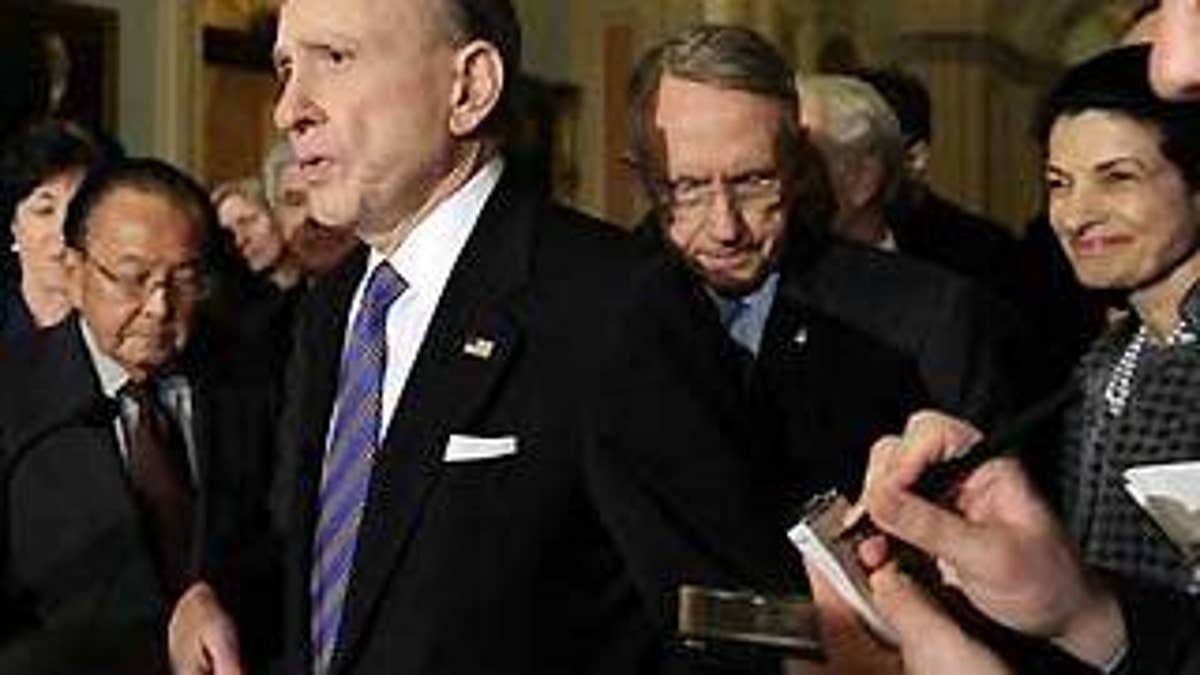
The House and Senate put the finishing touches on the economic recovery package Thursday, hours after reaching an apparent compromise on the measure President Obama hopes will jump-start the economy and create millions of jobs.
Leaders of both chambers were still trying to coordinate when they would vote on the final bill.
The House has pushed back a vote until Friday. And Democratic aides told FOX News the Senate might wait until Friday morning, or even Saturday, to clear the bill.
House sources told FOX News that Republicans are expecting to lose at least 15 votes when the House votes on the final bill. House sources said it's hard to gauge precisely how many Republicans might vote against the bill because lawmakers haven't prepared the final package.
Negotiators of the stimulus compromise most recently hit a snag in crafting provisions for education construction funding.
Some lawmakers were trying to write in added flexibility, according to two senior Senate Democratic aides, so that states can use money in a so-called school "modernization fund" to rebuild crumbling infrastructure. But Senate Republican negotiators demanded assurances that one-time money devoted to new school construction not become a recurring federal expense.
House Speaker Nancy Pelosi, in an afternoon press conference, downplayed the disagreement, saying, "We're very happy with the outcome."
She also downplayed reports about a communication breakdown Wednesday between her office and Senate Majority Leader Harry Reid's.
Pelosi was noticeably absent from Reid's press conference Wednesday afternoon with other Senate negotiators announcing the stimulus deal. Rank-and-file House Democrats said shortly afterward that they were displeased with some provisions in the final product and suggested Reid was premature in announcing a deal.
Pelosi said Reid was merely announcing the agreement that the Senate had reached, and that, "When we saw the language then we were on board ... but we had not seen the language."
A senior Reid aide also told FOX News "there was not clearly a breakdown."
The aide said the Senate reached a deal with moderates and the White House, before Reid called Pelosi to notify her of the deal and then held the press conference.
"We worked something out and the rest is history," the aide said.
The House rules committee is expected to post the finalized language of the bill on its Web site Thursday afternoon.
Senate and House negotiators reached a compromise bill estimated to cost $789 billion Wednesday. They trimmed billions from previous versions of the measure and settled on a package that contains 35 percent tax cuts and hundreds of billions in spending for infrastructure, education, health care, unemployment aid and other assistance.
Obama, who has campaigned energetically for the legislation, welcomed the agreement, saying it would "save or create more than 3.5 million jobs and get our economy back on track."
As Democrats reached for common ground, Republicans, all but three of whom opposed the bill in all its forms, were still unhappy with the final product.
Senate Minority Leader Mitch McConnell said the package is "not the smart approach."
Republican Sen. Bob Corker of Tennenssee told FOX News the bill would do little to attack the underlying problems with the economy.
"We're going to have nothing to show for this in a couple years," he said.
The $500-per-worker credit for lower- and middle-income taxpayers that Obama outlined during his presidential campaign was scaled back to $400 during bargaining by the Democratic-controlled Congress and White House. Couples would receive $800 instead of $1,000. Over two years, that move would pump about $25 billion less into the economy than had been previously planned.
Officials estimated it would mean about $13 a week more in people's paychecks when withholding tables are adjusted in late spring. Critics say that's unlikely to do much to boost consumption.
Millions of people receiving Social Security benefits would get a one-time payment of $250 under the agreement, along with veterans receiving pensions, and poor people receiving Supplemental Security Income payments.
An additional $46 billion would go to transportation projects such as highway, bridge and mass transit construction; many lawmakers wanted more.
The Obama plan offers a 60 percent subsidy to help unemployed people pay health insurance premiums under the COBRA program and divvies up $87 billion among the states to help them with their Medicaid costs for the next two years. It provides $19 billion to modernize health information technology systems, even though such funding will create few jobs right away.
To tamp down costs, several tax provisions were dropped or sharply cut back. A provision popular with Republicans and the big business lobby that would have awarded about $54 billion to money-losing businesses over the next two years was instead limited to small businesses, greatly reducing its cost.
A $15,000 tax credit for anybody buying a home over the next year was dropped; instead, first-time homebuyers could claim an $8,000 credit for homes bought by the end of August. Car buyers could deduct the sales tax they paid on a new car but not the interest on their car loans.
But nothing could shake negotiators from insisting on including $70 billion to shelter middle- to upper-income taxpayers from the alternative minimum tax, originally passed a generation ago to make sure the super-rich didn't avoid taxes.
The move is aimed at easing headaches that would follow if Congress passed it later in the year -- rather than creating jobs. The Congressional Budget Office estimates that provision will have relatively little impact on the economy.
In late-stage talks, Obama and Reid, D-Nev., pressed for $8 billion to construct high-speed rail lines, quadrupling the amount in the bill that passed the Senate on Tuesday.
Reid's office issued a statement noting that a proposed Los Angeles-to-Las Vegas rail might get a big chunk of the money.
Scaling back the bill to levels lower than either the $838 billion Senate measure or the original $820 billion House-passed measure caused grumbling among liberal Democrats, who described the cutbacks as a concession to the moderates, particularly Sen. Arlen Specter, R-Pa., who are feeling heat from constituents for supporting the bill.
Specter played an active role, however, in making sure $10 billion for the National Institutes of Health, a pet priority, wasn't cut back.
FOX News' Trish Turner and Chad Pergram and The Associated Press contributed to this report.




